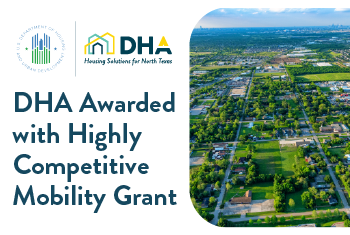
Apply Now for the Opportunity Rising Scholarship
DHA, Housing Solutions for North Texas, created the Opportunity Rising Foundation to offer students living […]
Troy Broussard, CEO of DHA, explains why empowering families to become self-sufficient is just as important as building affordable homes.
Dallas’ strong and diversified economy continues to boost the city’s multifamily market, with robust development and sustained investment reflecting North Texas’ healthy fundamentals. At the same time, median home sale prices in Dallas and the Dallas/Fort Worth/Arlington metropolitan statistical area have been increasing faster than incomes since 2011, making the regional housing market less affordable, according to a National Association for Latino Community Asset Builders report.
Multi-Housing News asked Troy Broussard, president & CEO of the DHA, Housing Solutions for North Texas, about affordability in the metro and the agency’s strategy to improve housing opportunities for low-income families.
How would you describe Dallas’ affordable housing market nowadays?
Broussard: There is a clear need for more affordable housing in Dallas and the North Texas region. The City of Dallas Housing Policy cites a shortage of approximately 20,000 units. The demand for affordable housing continues to grow here as our job market expands, which creates a significant opportunity for developers. The community is aware of this need and is working on various plans to create more affordable housing solutions. At DHA, we are focused on creating mixed-income developments and expanding private market partnerships for our Housing Choice Voucher clients.
In January, the DHA announced it had tapped 12 development firms to partner with in order to create more affordable housing throughout North Texas. How is that going?
Broussard: It’s going well. DHA’s first two sites identified for redevelopment are Brooks Manor and Cedar Springs. Brooks Manor is a 6.7-acre tract of land, zoned for retirement housing. We recently selected Volunteers of America National Services as our partner to redevelop the Brooks Manor site located in Oak Cliff/District 1. Volunteers of America National Services will be redeveloping the site as a housing site for seniors and persons with disabilities, and we anticipate construction will begin next year.
DHA issued a call for proposals to redevelop the Cedar Springs site in the Oak Lawn neighborhood to our pre-approved list of 12 qualified developers, including: AMTEX Multi-Housing, Carleton Development, Fairfield Residential, Matthews Southwest, McCormack Baron Salazar, Michaels Development Co., Ojala Partners, The NRP Group, Trammell Crow Co., Volunteers of America National Services and the combined team of DFW Advisors, KRR Construction and Michael R. Coker Co. DHA is currently evaluating the proposals received and anticipates a thorough vetting of their fresh ideas to redevelop these sites as mixed-income properties.
What affordable housing options do low-income residents in the Dallas market currently have?
Broussard: There are two main affordable housing solutions provided by DHA. The first is public housing where residents pay a subsidized rent at properties owned and operated by DHA and the second is the Housing Choice Voucher program, where DHA provides housing assistance payments for clients who select housing in the private rental market. The Housing Choice Voucher program provides opportunities for homeownership assistance available to qualified borrowers, where financial assistance is available to help pay part of their mortgage. DHA provides housing services to roughly 55,000 individuals, which includes 16,500 Housing Choice Voucher households and 3,155 families in public housing units.
How does Dallas’ public housing inventory look like?
Broussard: DHA is one of three housing agencies in Dallas. Others include Dallas County and the City of Dallas Housing Department. At DHA, we currently manage 3,155 public housing units across 27 developments.
What kind of incentives can developers get in North Texas?
Broussard: There are several incentives and programs that support developers investing in North Texas, including tax increment financing (TIF), public improvement districts (PIDs) and opportunity zones. Dallas currently has 18 active TIF districts, 14 PIDs and 15 federally designated opportunity zones. Additionally, low-income housing tax credits offer developers 9 or 4 percent tax credits as an incentive to develop affordable housing for low-income households.
What is your opinion on rent control? How would it impact the metro’s affordable housing market?
Broussard: We believe income diversity is important to the future growth of North Texas. We would not want to see a rent control program that disincentivizes development because the need for more affordable housing is so great. What we think is going to be an important strategy moving forward is providing families with a better path to self-sufficiency. DHA is working toward solutions to help people successfully move to high-opportunity areas, to improve their education and skills to secure gainful employment and to have better education opportunities for their children.
What is your affordable housing strategy for the years to come?
Broussard: We are focused on improving affordable housing opportunities for the families we serve in three main areas:
Enhanced public-private partnerships, supporting mixed-income communities, investing in neighborhoods with high levels of poverty and supporting self-sufficiency pathways for our families is a significant undertaking. We are committed to these priorities and are excited about the impact we can make in the region.
To view the original article published by Multi-Housing News, please visit: https://www.multihousingnews.com/post/tackling-the-affordable-housing-shortage-in-north-texas/

DHA, Housing Solutions for North Texas, created the Opportunity Rising Foundation to offer students living […]

DHA leveraged innovative technology and a data-focused approach to deliver rent relief to over 6,000 […]

Funds will expand housing choices for Housing Choice Voucher (HCV) families with children by increasing […]